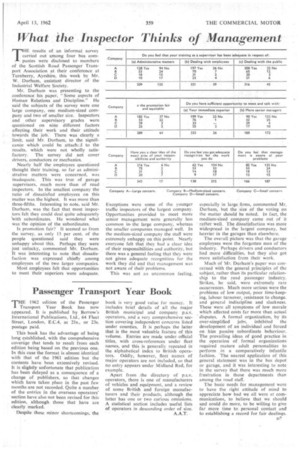What the Inspector Thinks of Management
Page 57

If you've noticed an error in this article please click here to report it so we can fix it.
THE results of an informal survey carried out among four bus companies were disclosed to members of the Scottish Road Passenger Transport Association at their conference at Turnberry, Ayrshire, this week by Mr. W. Durham, assistant director of the
Industrial Welfare Society. .
Mr. Durham was presenting to the conference his paper, "Some aspects of Human Relations and Discipline." He said the subjects of the survey were one large company, one medium-sized company and two of smaller size. Inspectors and other supervisory grades were questioned on nine different factors affecting their work and their attitude towards the job. There was clearly a limit, said Mr. Durham, to the significance which could be attachci to the results, which were not wholly satisfactory. The survey did not cover drivers, conductors or mechanics. .
Nearly half the employees questioned thought their training, so far as administrative matters were concerned, was inadequate. This was true of garage supervisors, much more than of road inspectors. In the smallest company the ratio of dissatisfied employees on this matter was the highest. It was more than three-fifths. Interesting to note, said Mr. Durham, was the fact that most inspectors felt they could deal quite adequately 'With subordinates. He wondered what was the opinion of the subordinates.
Is promotion fair? It seemed so from the survey, as only 13 per cent. of the people questioned said they were unhappy about this. Perhaps they were just unlucky, commented Mr. Durham. It was interesting to note that dissatisfaction was expressed chiefly among employees of the two larger companies.
Most employees felt that opportunities to meet their superiors were adequate.
Exceptions were some of the younger traffic inspectors of the largest company. Opportunities provided to meet more senior management were generally less common in, the large company, whereas the smaller companies managed well. In the medium-sized company the staff were extremely unhappy on this point. Nearly everyone felt that they had a clear idea of their responsibilities and authority, but there was a general feeling that they were not given adequate recognition for the work they did and that management was not aware of their problems.
This was not an uncommon feeling, especially in large firms, commented Mr. Durham, but the size of the voting on the matter should be noted. In fact, the medium-sized company came out of it rather well. The dissatisfaction was more widespread in the largest company, but heavier in the garages than elsewhere.
The overall picture was that the garage employees were the forgotten men of the industry. Perhaps drivers and conductors had more difficulties, but they also got more satisfaction from their work.
Much of Mr. Durham's paper was concerned with the general principles of the subject, rather than its particular relationship to the road passenger industry. Strikes, he said, were extremely rare occurrences. Much more serious were the problems of low output, poor time-keeping, labour turnover, resistance to change. and general indiscipline and slackness. These were all symptoms of low morale which affected costs far more than actual disputes. A formal organization, by its over-simplified jobs, inhibited the development of an individual and forced on him passive subordinate behaviour. The prevailing ideas of good practice in the operation of formal organizations required mature adult personalities to perform in a comparatively infantile fashion. The nearest application of this general statement was in the bus depot or garage, and it was interesting to note in the survey that there was much more frustration in those departments than among the road staff.
The basic needs for management were to have the right attitude of mind to appreciate how bad we all were at communications, to belieVe that we should and could do more, to be willing to give far more time to personal contact and to establishing a record for fair dealines.




















































































































